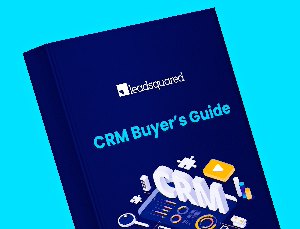A good accountant may not succeed in selling a product, and a good salesperson may not be a good copywriter.
What does it mean?
That, every job requires a definite skill set.
So does sales.
Sales reps need to have the skills to close deals and create engaging, meaningful experiences for customers.
Most roles in sales need a healthy mix of soft and hard sales skills.
Let’s look at them in detail and how they enable you in your sales journey.
What are sales skills, and why do you need them?
Sales skills are the competencies a rep should have to successfully sell a product/service. It includes skills like prospecting, knowledge of sales tools, etc., and communication skills like persuasion, negotiation, etc.
Consumers are constantly seeking positive encounters and meaningful buying experiences. Therefore, reps must have ample knowledge about the product, competitors, trends, and market. Ultimately, a rep is responsible for enacting the exchange of value between a customer and a company.
If you’ve noticed, these skills fall under two broad categories that are:
- Hard skills
- Soft skills
Let’s go through the sales skills that every rep needs to excel at!
The must-have hard skills for sales reps
Job-specific hard skills, or technical skills, are essential to each role in a company. To put it another way, each job in an organization will involve a distinct set of skills.
An accountant, for example, must be able to reconcile bank statements. An architect or marketer, in comparison, does not need that knowledge. Similarly, preparing corporate presentations is a skill most accountants won’t use.
In sales, you may come across several roles such as SDR, BDR, Team Lead, and more depending on the functions like inside sales and field sales.
However, the common sales skills you should have are:
- Prospecting
- Product knowledge
- Competitor awareness
- Information about their existing customers
- Skills to use sales software like CRMs, prospecting tools, and more
- The ability to research
Let’s begin with prospecting skills.
1. Prospecting
Prospecting is no easy business in the eyes of most salespeople. Sales reps must establish a strategic approach to prospecting to be successful. They must prospect regularly to discover potential business opportunities.
It demands the ability to perform:
- Market research
- Cold outreach (cold calling and cold emailing)
Prospecting can be hard work without the help of adequate data. Moreover, sales reps need substantive training to prospect successfully.
According to the LinkedIn State of Sales Report 2020, 56% of sales reps generally use data to find leads.
Having data is just one piece of the puzzle. You’ll also need to research well about the prospect before approaching them. Once you do so, you increase the chances of finding clients who actually need your product. And needless to say, such leads have more chances of conversion.
Some of the tools that can assist you in your prospecting journey are:
2. Product knowledge
LinkedIn State of Sales Report 2021 pointed out some of the biggest deal-breakers for buyers. The number 1 deal-breaker revolves around a lack of product knowledge. 48% of buyers agree that misleading product information kills a deal instantly.
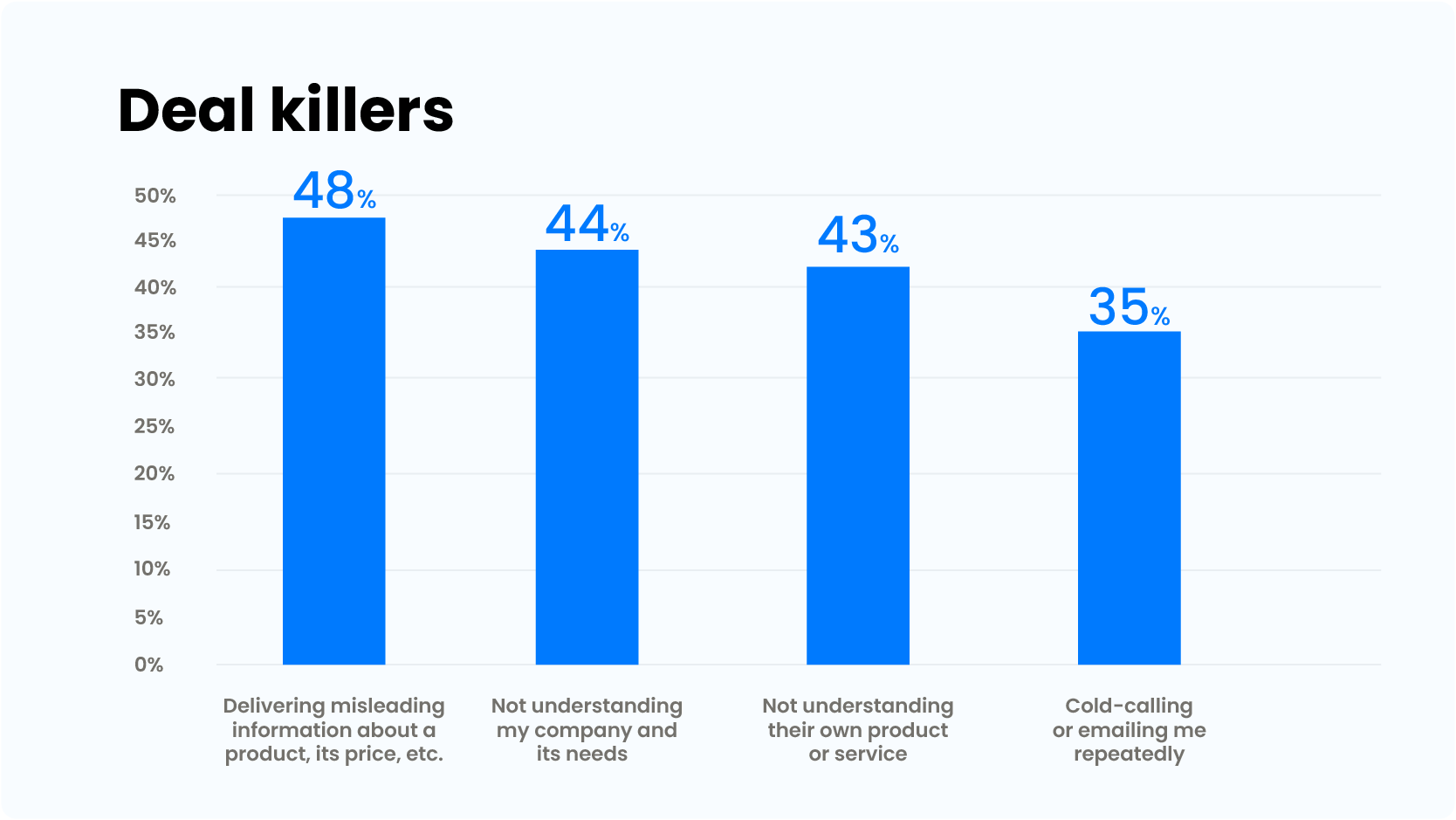
This one is a bit of a no-brainer. Sales reps need to convey their product’s use cases and capabilities accurately. For instance, imagine you sell three ice cream flavors. They are chocolate, vanilla, and strawberry with their respective sauces. Buyers can mix and match according to their tastes and mood.
You already know that you don’t sell mango or caramel-flavored ice cream. Your awareness ensures that no customer has false ideas about the flavors you offer. Similarly, reps should sell their company’s products knowing what they do and don’t offer.
The simplest way to ensure that you don’t oversell or undersell your offering is to go through the sales presentation decks your team prepared. Generally, companies create sales enablement repositories to help sales reps with the required documents along the sales journey. But ultimately, it’s your job to go through the documents and apply your knowledge while interacting with prospects.
3. Pitching
In your sales journey, you’ll come across several instances to meet buyers and propose your offering. For example, during networking events, fairs, trade shows, etc.
If not, you’ll find cold calling and cold emailing as a part of your prospecting process, where you’ll pitch your product/services to the potential buyer.
The purpose of a sales pitch is to invite a conversation and not necessarily to sell the product.
Make sure you convey the idea within just a couple of minutes. Brevity is also a sales skill that you must look into.
4. Client engagement
As you may know, not all leads are ready to buy from day 1. Sometimes, they’re exploring other products/services, while other times they want more information to be sure of their decision.
For instance, we analyzed the buying patterns from 2013 to 2024. We found that hardly 10-12% of sales close within a day. Others require nurturing and follow-ups.
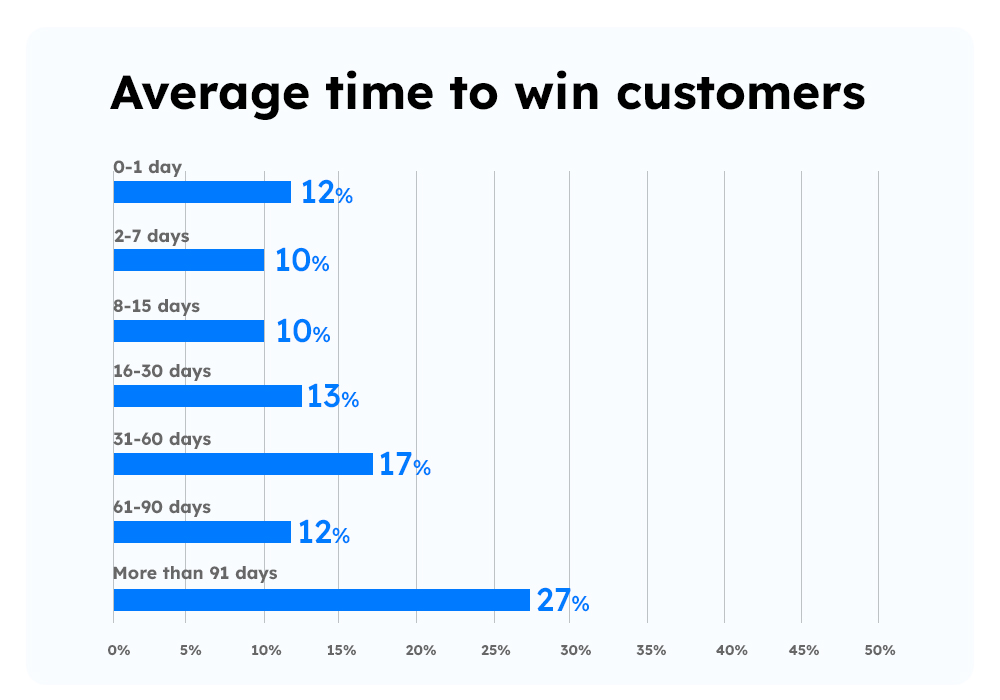
Therefore, the ability to engage with clients and nudge them from time to time becomes an important sales skill. There are several ways to go about it; for example, follow-up emails, follow-up calls, invitation to participate in a webinar, and more. The point is, you need to figure out what customer engagement strategy works in your domain.
5. Competitor awareness
The saying “Keep your friends close, and your enemies closer” makes perfect sense in this context. The perfect strategy to know your’s and your competitor’s competencies is a SWOT analysis. SWOT is an acronym for Strengths, Weaknesses, Opportunities, and Threats.
Sales reps need to analyze and understand the industry they navigate to succeed. For instance, you must have heard it several times.
“XYZ company offers the same features at 123 price point.”
This is a sales objection most reps come across when selling to a prospect who either:
- Possesses in-depth industry knowledge, or
- Is an existing client of a competitor
You can handle this objection with ease if you:
- Know the value you offer is higher
- Know your competitor’s weaknesses and your product’s strengths.
So, don’t give in to objections along these lines and analyze your competitors regularly. It also brings us to the next important skill in sales—handling objections.
6. Objection handling
Dealing with objections is an inevitable and challenging part of the sales process. The process entails specific actions and skills that involve a bit of learning. Some soft skills that fall under objection handling are:
- Mindfulness
- Gathering background knowledge
- Leading with compassion,
- And asking intelligent, open-ended questions
But, in general, objection handling requires a level of deftness that most reps need to succeed. It demands a level of product, prospect and industry knowledge to handle. For instance, the capacity to deal with change is more vital today than it was five years ago, according to 75% of sales professionals.
This means that knowing how to overcome unexpected situations, such as a sales objection, is a must.
7. Knowledge about existing customers and your company’s ICP
In one of their articles, Boardview referenced a case study to show the effectiveness of creating customer profiles. They found that using a buyer persona increased ROI by 20%. This increase is no surprise to companies who use personas to sell.
But to create an ICP (Ideal Customer Profile), you need to have a clear view of the people who use your product.
So, narrow down the demographic details and personality traits of your current customers. Then, compile the information in a sharable and easy-to-read format.
Here’s an example of an ICP we created a while ago.
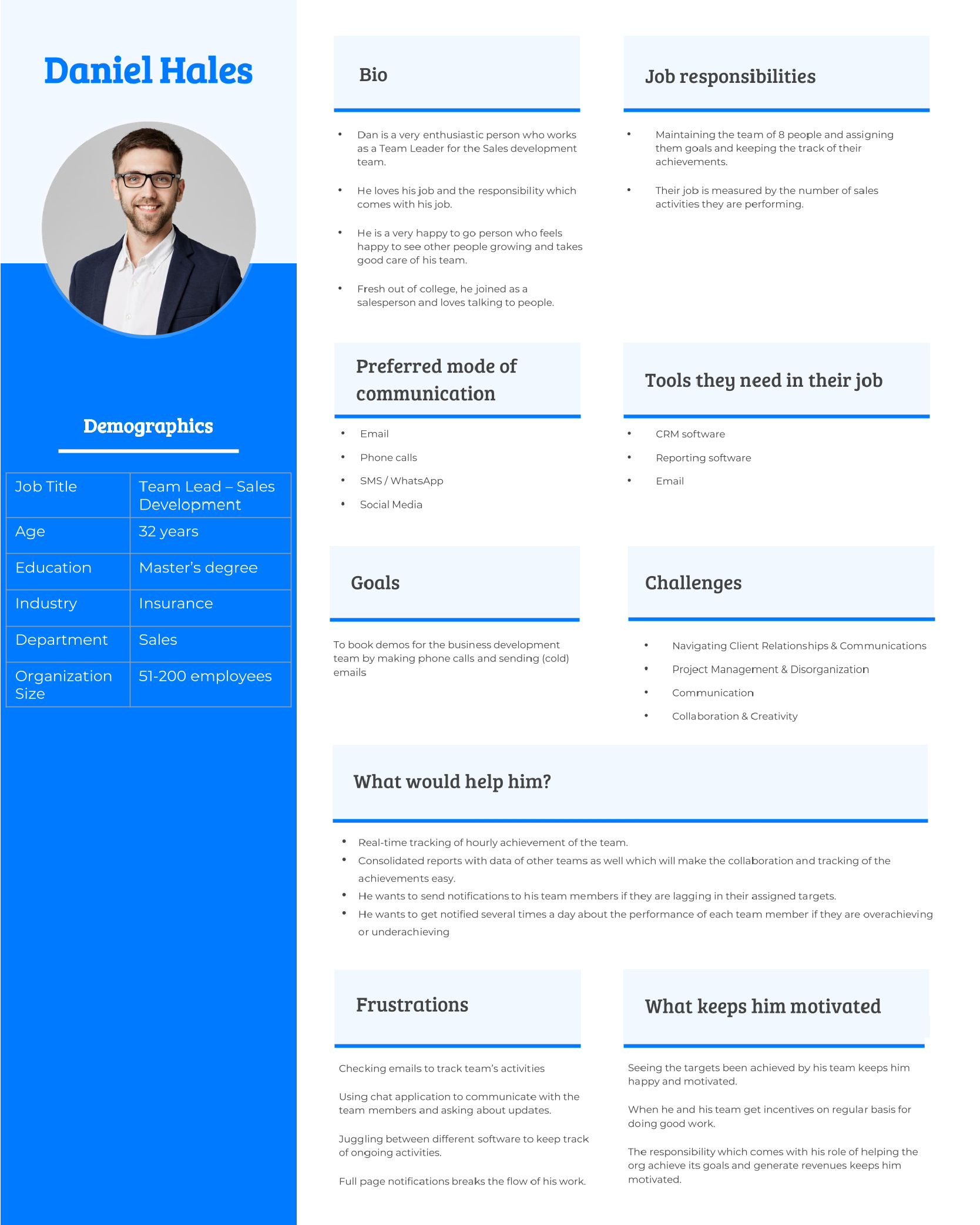
You can also download this editable pdf to create your own ICP.
Note that finding your next customer starts with observing your existing customers. The best tools to help you qualify leads based on your ICP are CRMs and sales qualification tools.
We’ll get into those in the next section.
8. Ability to effectively use CRMs, prospecting tools, and other sales software
Dynamic Consultants believes that in 2021, the CRM ROI rose to roughly $30.48 for each dollar invested. Sales reps worldwide recognize the importance of CRM in their daily lives. Learning how to navigate and use CRMs is now a skill they need to acquire.
As mentioned, prospecting tools are handy for every sales rep. Most CRMs provide these tools as integrations or offer APIs to help connect both apps. Making your job as a sales rep more manageable and efficient.
Some of the most common benefits of using a CRM are:
- Obtaining high-quality leads
- Lead nurturing and sales forecasting
- Ability to create ideal customer profiles
- Sales automation
- Accurate lead distribution
The list goes on depending on the CRM and the seller’s needs. If you’re looking for CRM software to accelerate sales, I recommend LeadSquared.
Keeping the needs of sales reps in mind, it blends well with your existing processes and automates mundane tasks.
We asked our 3000+ sales users about LeadSquared features they love the most and found that lead management and reporting top the list.
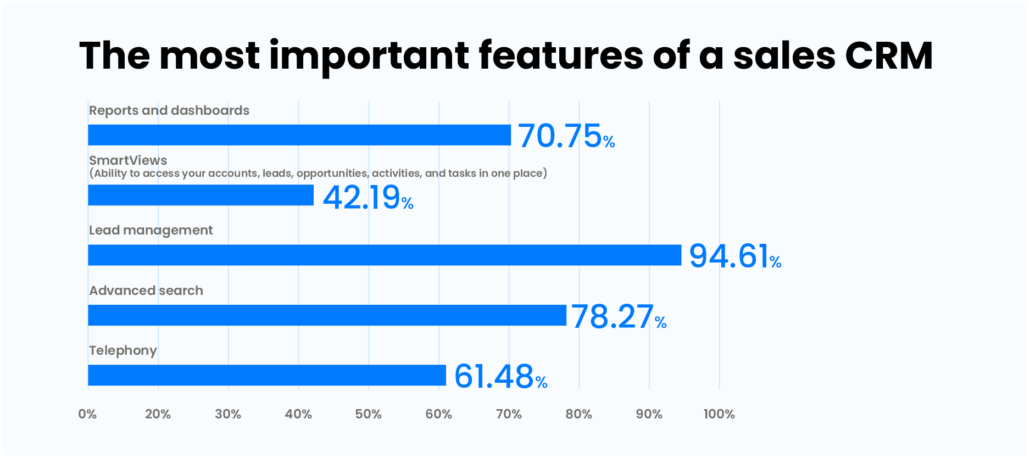
9. The ability to research
Every sales rep should have the ability to make data-driven decisions while selling. This revolves around their ability to conduct in-depth customer research and analysis.
Gartner’s 2022 report on customer service trends found that:
- Better information and data delivery to clients and reps are “important” or “very important” according to 74% of survey participants.
This means that well-informed, research-backed information is essential to selling. Buyers expect data-driven information, and sales staff too need it to close deals.
A fast Google search might sometimes provide you with the information you need. But researching your customer’s needs, getting regular feedback, and implementing the changes they expect is the key to sales success.
Helpful feedback tools for customer surveys could be:
10. Social selling
The process of creating connections as part of the sales cycle is known as social selling. This process begins when you post material on social media about your brand or solution. If you haven’t integrated social selling into your pipeline yet, you’re probably sacrificing revenue to competitors who are more social media aware.
With social selling, 31% of sales reps claim to be able to develop stronger ties with their clientele. You might wish to use social selling to sell vehicles, vacations, tours, and other services. You can interact with your desired customers by:
- Addressing their concerns
- Thanking them for their participation
- Answering any queries
make sure you respond to people as they like, comment, or share your posts.
Social selling is a hard skill that will only grow in demand over time. Sales reps should invest in understanding and engaging with customers across social media.
11. Virtual selling
Another newly-found skill in sales is—virtual selling. Since the pandemic, digital interactions between buyers and sellers have increased and the trend is here to stay.
“COVID has, obviously, forced a lot of people to sell virtually, but it’s a trend that’s been happening for a while. Like a lot of exponential changes, it was happening slowly, and now suddenly.”
Matt Heinz, President, Heinz Marketing (via LinkedIn)
So, reps must be know how to use software like Zoom, Google Meet, Teams, etc. while still being able to make their sales pitch.
In general, virtual selling involves the following sales processes happening virtually:
- Prospecting
- Client engagement
- Onboarding
To succeed in virtual selling, you’ll need to have:
- Ability and ambition to work digitally
- Understanding of data and digital tools
- Ability to coordinate with internal teams, external vendors, and customers
12. Closing
More than 36% of salespeople say that closing is one of the most difficult parts of their job.
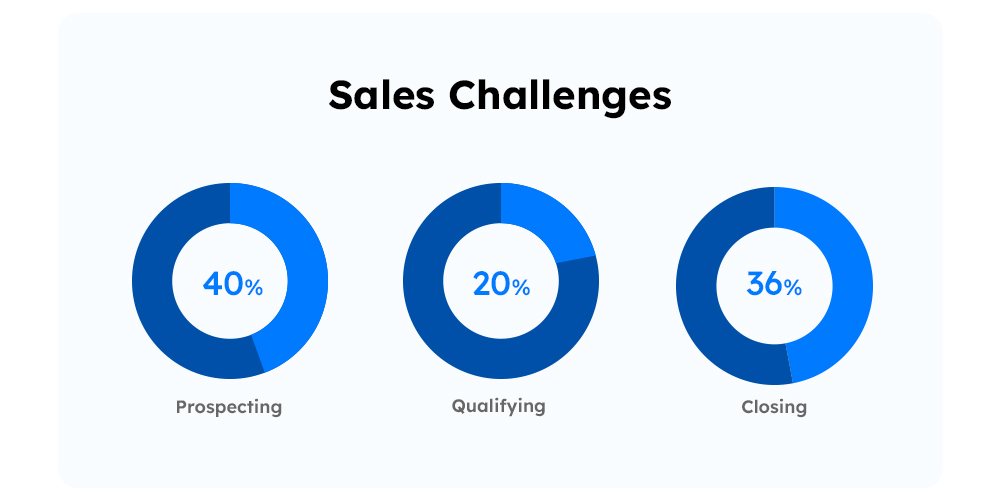
It is also a crucial sales skill after all, as it determines if all your hard work has paid off.
There are several sales closing techniques you can learn. Sales reps who make it look easy, are actually well prepared. The key is to apply your communication, persuasion, and negotiation skills in a way that allows them to sign the final contract with you.
13. Digital onboarding
Onboarding is the process that new users/customers go through to start using your product.
It can be a simple product walkthrough or complex training to use your product. With sales happening virtually, onboarding has also taken a digital route. As an account manager, you’ll need to ensure that your customers efficiently use your product and its features.
Digital onboarding may require a range of tools for KYC, signing contracts, and sharing/accessing necessary documents. Just for your knowledge, some of the tools that help in customer onboarding are:
- Self-serve portals: LeadSquared
- Onboarding software: Whatfix, CustomerSuccessBox, Loom, Gainsight PX
- Digital signature tools: DocuSign, PandaDoc, Adobe Sign, Jotform Sign
- eKYC/Video KYC: LeadSquared, Kwik.ID, Signzy
Experience in onboarding clients and the use of tools will make your life easier.
So, these are the essential job-specific skills sales reps must possess. Sometimes, specific domains within sales require unique skill sets.
For example, in SaaS, sales consultants might need the knowledge of Jira (a system to create and track software development tickets). In another instance, pre-sales teams may require some understanding of product development and customization options.
However, you can always acquire niche skill sets depending on your role in sales.
Now, let’s move on to the interpersonal skills expected from salespeople.
The must-have soft skills for sales reps
Soft skills are interpersonal attributes that include personality traits and communication styles. Some soft skills are valuable in all employees, regardless of their role or level of competence. Whereas other soft skills are job-specific and useful in some positions but not in others.
For instance, sales reps often interact with different kinds of people daily. This means they must have the ability to communicate effectively. In most cases, relationship-building skills are what we call soft skills. Examples of soft skills in sales are:
- Communication
- Active listening
- Rapport building
- Discipline
- Time management
- Critical thinking
- Persuasion
- Negotiation
Let’s start with communication skills in sales.
14. Communication
Building genuine relationships with clients requires good communication skills. It’s nearly impossible to find a buyer’s pain points without frequent interaction.
It’s critical to remember that communication entails more than speaking effectively and eloquently. Especially with the rise of omnichannel communication, adapting to different mediums is essential.
Today, you can communicate via email, social media comments, video calls, and more. Failing to do can be costly in your job. As customers may even decide to stop doing business with you.
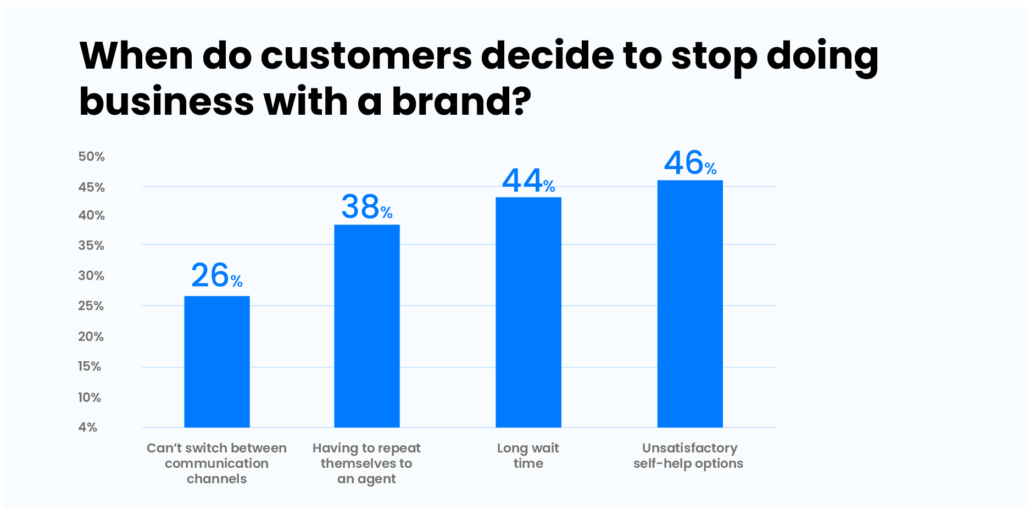
Sales agents who call leads 6 times boost their contact rate by 70%. This means that persistent efforts to communicate pay off in the long run. The key to meaningful interactions and effective communication lies in the next point, active listening.
15. Active listening
“Active listening” ranks first among the qualities consumers value most in sales reps. Sales reps tend to gain a reputation for talking rather than listening attentively.
It makes sense to want to talk more because you need to convey the benefits of your product. But listening is of much higher importance when it comes to recognizing buyer needs.
When a rep fails to actively listen, the prospect receives the following negative messages.
- The rep wants to close the deal asap so that he or she can move on to the next deal.
- The salesperson’s requirements are greater than those of the potential customer.
In contrast, when a rep actively listens to client needs:
- The client recognizes your respect for their needs and feels understood.
- The few objections you receive will revolve around the challenges they face rather than your product.
- The prospect is confident that the solution purchased will genuinely meet their requirements.
More listening than talking is also a mantra for success in closing deals.
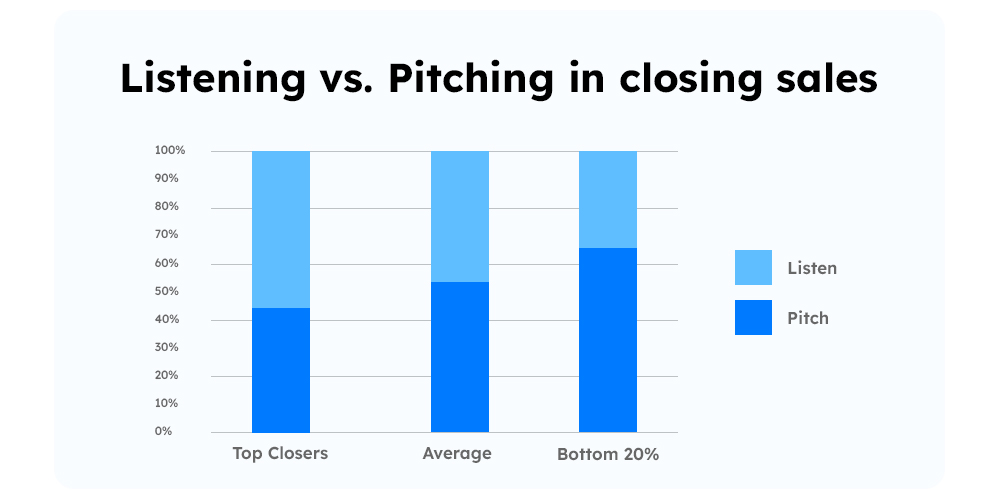
When you listen actively, you can figure out whether your product is a good fit for your lead. Consequently, you will build a trustworthy and reliable reputation among your clients.
16. Probing
Probing is the precursor to any form of long-term communication with your clients. Most sales reps use the foot-in-door technique to probe for an answer or insight. The foot-in-door technique relies on what most people call the psychology of compliance.
Compliance is a kind of social influence in which a person does what another person wants them to do, usually in response to a request or suggestion. It’s similar to conformity, except instead of an order, it’s a request.
The foot in the door technique is a compliance strategy based on the assumption that agreeing to a minor request enhances the likelihood of agreeing to a larger request in the future.
So, you make a minor request at first, and if the person agrees, it becomes more difficult for them to refuse a larger one.
Using this technique you can first probe with harmless questions that fall under small talk. Some examples of probing questions are:
- How was your day?
- Is this a good time to talk?
- Is there anything else you’d like to know?
Probing is a necessary soft skill for everyone in the sales industry. It gives you the opportunity to assess your lead’s interest and engagement levels.
But beware, when probing always ensure that the responder is ready to answer. If the prospect feels uncomfortable or expresses disinterest, apologize and move on to the next lead.
17. Rapport building
It’s all about embracing the value of human connections in sales. While trying to hit your monthly quotas, it may appear like nurturing a bond is a luxury you can’t afford. Many reps believe that every interaction with a prospect is a chance to clinch a deal.
In reality, sales require far more than a quick call. Buyers need to know that salespeople are trustworthy and genuine.
Your sale depends on the trust you establish from start to finish. If you stick to a one-track mind of making a sale, chances are you won’t. Instead, build rapport through a set of questions and practice active listening.
Examples of some rapport-building questions are:
- What do you wish to accomplish in the near future?
- I see that you’ve posted about the XYZ issue on LinkedIn. What do you think is the best way to overcome it?
- When did you start your ABC journey at this company?
Asking open-ended questions is a great way to build rapport and understand your prospects.
18. Discipline
Discipline seems like a fairly traditional concept in an ever-evolving sales sector. Most of us tend to overlook its value as the term reminds us of institutions like school or college. The most challenging aspect of sales development is instilling discipline at every stage.
This discipline, when followed, produces better and more dependable results. For instance, if a rep calls back at a mutually agreed time, 42% of prospects would be more inclined to buy.
This means that most reps who fail to do so lose the chance to sell.
So how can you foster discipline into your daily life?
- Track and measure your performance. The best way to stay disciplined is to know your results and performance level. When you are aware of your errors, you can promptly fix them. Additionally, you can reuse tactics and pitches that led to a sale.
- Sales training should take place regularly regardless of the seller’s seniority. The sales landscape is constantly shifting, and we need to keep up.
- Create a list of short-term achievable goals that lead to long-term success. I know this one isn’t as easy as it sounds. But even calling a lead at the right time is a step to sales success.
But in all honesty, discipline depends on the next point, time management.
19. Time management
According to a study by the Business Wire:
- Barely 28% of salespeople use a systematic time management technique.
- Hardly 37% of reps spend time on tasks that generate and boost income.
Time management is crucial to winning deals and nurturing leads. Sales reps must invest in time management techniques and tools to sell successfully. I’ll suggest two tools to help you manage time while being productive.
It is a time-management, efficiency, and scheduling framework. It’s intended to assist you in prioritizing a list of chores or agenda items. You do so by first classifying them according to their immediacy and value.
#2 The Pomodoro technique
It is a method of concentrating on a task for 25 minutes without interruptions. Post the 25 minutes, you get a five-minute break and repeat the previous process. It is one of the easiest time management techniques in use worldwide.
Even 4-5 Pomodoro sessions per day will help you accomplish more. You can use this online Pomodoro timer to focus on the task at hand.
You can also use LeadSquared Sales CRM software to manage and prioritize your tasks like appointments, follow-ups, and more. Take a look.

Implementing a time management technique or tool instantly boosts productivity. Try to follow a method that works for your needs specifically. And lastly, don’t “just deal with whatever comes up.”
20. Critical thinking
TalentLens, a Pearson business, surveyed over 400 HR professionals and found that:
- The most crucial skill they want from employees in 5 years is critical thinking. Also, critical thinking ranked first among a range of personality traits and skills.
- In fact, it exceeded the need for innovation and IT applications at the workplace.
In most occupations, critical-thinking skills are a necessity for success. Critical thinking encompasses problem-solving, decision-making, and a range of thinking processes. It is helpful for issue resolution and conflict management in the sales cycle.
Critical thinking among sales reps can help them zero in on any customer challenges. Selling the solution is just the result of finding a path to fixing a problem. They come up with innovative approaches to overcome objections and help clients.
Here are the ways to promote critical thinking when selling:
- Identify the customer’s challenges and their demands from a product.
- Research about existing options that may help your client accomplish their goals.
- Discuss and interact with the client about possible solutions.
- Present a personalized offer for your client
- Analyze their final decision.
21. Persuasion
Sales is all about persuasion. Isn’t it?
You try to persuade them for:
- A meeting
- A purchase
- Subscription renewal
- Upselling, cross-selling, and referrals.
However, persuasion is not nagging. It’s not manipulation. You don’t deceit them to buy something either. Instead, you try to alter their thinking about any existing challenges they face.
It’s merely a matter of using fundamental psychological theories to garner positive results. Persuasive techniques help increase conversion rates and deal closures.
But this may not be in the way you think. A study of 33 experts in sales and marketing found:
- 81.3% of experts use persuasive techniques for one significant cause—building relationships.
Persuasive techniques like reciprocity, liking, and consistency revolve around gaining trust. As mentioned before, trustworthy sales reps close more deals.
22. Negotiation
When you work in sales, you’ll have to negotiate with customers sometime or the other. If you want to close more transactions, you should know how to prepare for each sales discussion.
A sales negotiation is a planned conversation between a client and a seller that aims to clinch a deal. The purpose of negotiation is to create a solution that everyone can agree upon.
But applying negotiation strategies in real life seems a lot harder than it is on paper. As a Sales Research paper by the Rain Group found:
- Buyers claim that at least 6 in 10 sellers yield on pricing during negotiations.
- Price concessions without a trade-off for value are rarely the optimal strategy.
Starting high on price and negotiating down is 1.7X more common for top performers. But top-performing sales reps aren’t born with such negotiation skills. Top performers are 9.3X more likely than the others to get highly effective negotiation training.
This means that you can learn how to negotiate effectively to accomplish your sales goals.
Negotiation Mastery is one such course offered by Harvard Business school. And I’m sure there are many more options online.
That brings us to the end of the soft skills you need as a sales rep.
The takeaway
The sales cycle will always reflect its unique environment and the buyer’s needs. Old-school sales skills are relevant to this day, despite the new-age tools we use these days.
The only difference in current sales processes is the tools that help shape our skills. We have the opportunity to use planners, scheduling apps, and more to manage time. CRMs can automate several manual tasks for us.
There are several mediums of communication available to reps worldwide. The list goes on in terms of innovations that help us improve as salespeople. Ultimately, it boils down to taking the first step towards applying these skills at work. Once you do so, you have a much higher chance of being a top performer at your workplace.








![[Webinar] Maximizing ROI with WhatsApp CRM](https://www.leadsquared.com/wp-content/uploads/2024/07/Maximizing-ROI-with-WhatsApp-CRM-webinar-popup.gif)
